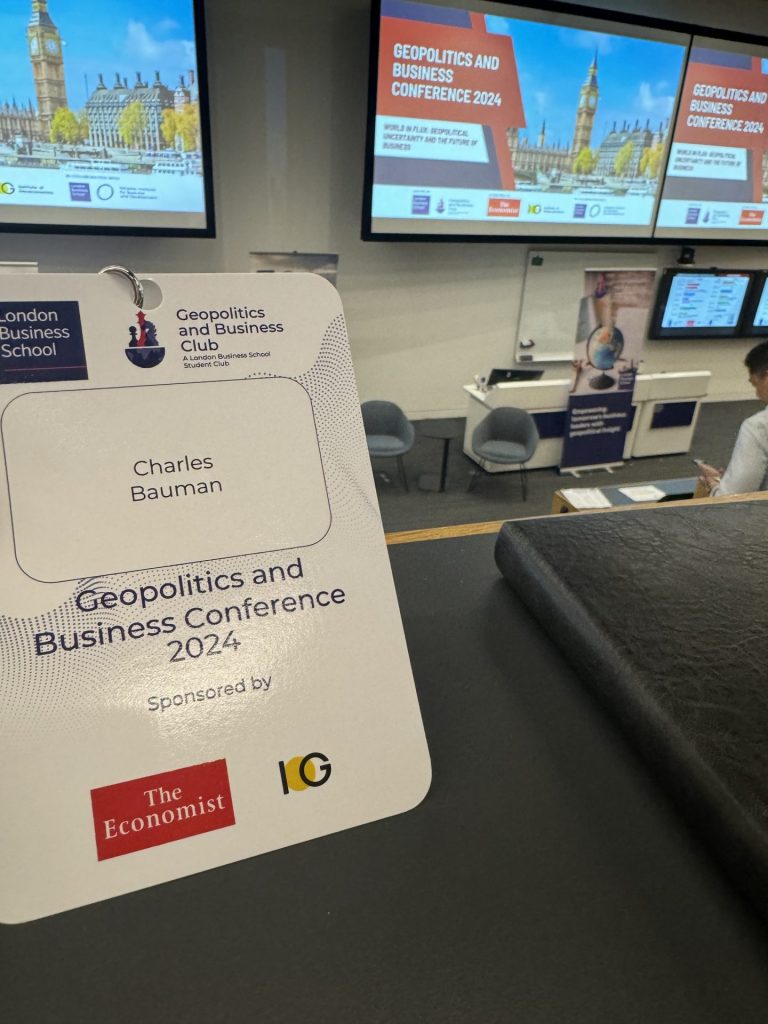The era of fragmentation is here: Geopolitics and Business Conference
by Charles Bauman, Consultant
3 May 2024
The world of late seems on fire. Conflict around the world is increasing, people are polarised and markets are fragmenting. This was the underlying feeling at this year’s London Business School “World in Flux: Geopolitical Uncertainty and the Future of Business” conference.
Against a chaotic backdrop, business leaders and key thinkers discussed where opportunities lie for firms navigating a complex international landscape. Attendees were privy to discussions that explored the far-reaching implications of the super-election year of 2024, an evolving energy landscape, and AI and its impact on global order.
Through this mix of unpredictable external factors, understanding the interplay and impact between geopolitics and business has never been a greater driver on influencing corporate strategies.

Why does a year of elections actually matter to business?
The first session of the conference centred around this super-election year, focusing on why the elections of 2024 were important and why businesses should care. Answering that question the consensus was that these elections, across Asia, Europe and in the United States, were important not for the sheer number of people voting, nor domestic policy issues, but for their potential to influence great power rivalry and resultant disruptions to global markets.
Elections in Europe, taking place in June, are a worry to businesses as current polling shows a high probability for far-right parties to make gains. While founded on the principle of an open market amongst member states, businesses are anticipating they may no longer be able to take this moderate, consensus-led approach for granted. These parties may clash as well with national politics, driving a wedge between EU and member states and slowing action on global issues. Further, and dependant on elections in the US, the composition of EU leadership could further distance the bloc from the United States through protectionism and other trade-focused restrictions.
Much of the global punditry is closely watching the US elections. The choice in candidates is between one who has settled into a “protectionism-lite” view on international trade and the other who teeters on the brink of a trade war with allies and non-allies. Either way, US policy of isolationism risks allowing adversarial states more room to manoeuvre and set terms in a variety of critical regions and markets.
This threatens established business links as the possibility of a new “power” moves in and sets new regulatory, cultural or other standards for companies.
Can AI be governed for good?
As AI remains in the headlines, this conference also took aim at the topic. Speakers discussed AI in the context of the need for global governance. AI is being, or soon will be, regulated by national governments or the EU. However, will there soon be need for global governance? For example, International Atomic Energy Agency (IAEA) model would bring together stakeholders to find solutions on how to limit the weaponisation of AI, such as those used to enhance disinformation efforts and disrupt elections in democratic states.
Further, a global governance mechanism is necessary to bring governments and businesses together. Currently, a handful of businesses operate the largest and most influential AI tools and the infrastructure they run on. These few businesses can leverage their technology to influence other businesses and governments and dictate terms of operation within various markets. A global governance mechanism would treat these firms as global actors, bringing them to the table, which gives them a voice and increases accountability toward others.
Have firms still got the energy?
Energy security came to the forefront in a big way after the Russian invasion of Ukraine, as the EU and UK scrambled to secure new energy supply lines. A key consideration for energy security efforts is where they align with the net zero transition. Both aims are mutually inclusive, in that steps to achieve one will secure the other.
Countries are rushing both to reduce their emissions and also their reliance on foreign sources of energy. Taking these steps bolsters a country’s ‘power’ on the global stage as it reduces reliance on other countries and the potential to be “bullied” or “blackmailed” into going against their own interests. In effect, it allows countries to equalise power at the negotiating table when looking to secure or strengthen market access for their industries.
What does this all mean for business?
How can businesses navigate the geopolitical landscape, mitigating risks and ultimately thrive amidst such turbulence? Having the right people, with the right intel to hand, matters now more than ever.
At H/Advisors Cicero, we equip businesses to navigate the complex geopolitical landscape with expertise and strategic insight. Our consultants provide valuable perspectives on international dynamics, helping companies make well-informed decisions in an increasingly fragmented world. We support with:
- Strategic Insight: Our consultants analyse global political climates and deliver strategic advice, enabling businesses to anticipate and adapt to changes effectively.
- Scenario Planning: Our team excels in forecasting the impacts of geopolitical shifts, helping businesses develop proactive strategies for all potential future challenges.
- Effective Communication: We aid businesses in clearly articulating how geopolitical events impact their firms and their needs to policymakers and stakeholders, ensuring their voices are heard in critical policy discussions.
Despite global uncertainties, we encourage businesses to view these challenges as opportunities for innovation and leadership. By collaborating with H/Advisors Cicero, businesses can influence policy, enhance economic stability, and set new standards in their industries. Through effective communication, businesses can also demonstrate their and leadership to both policymakers and the public.
